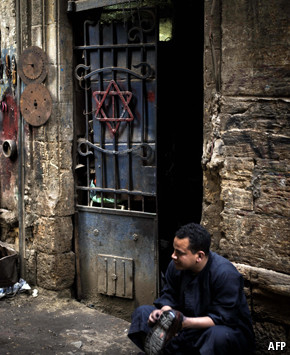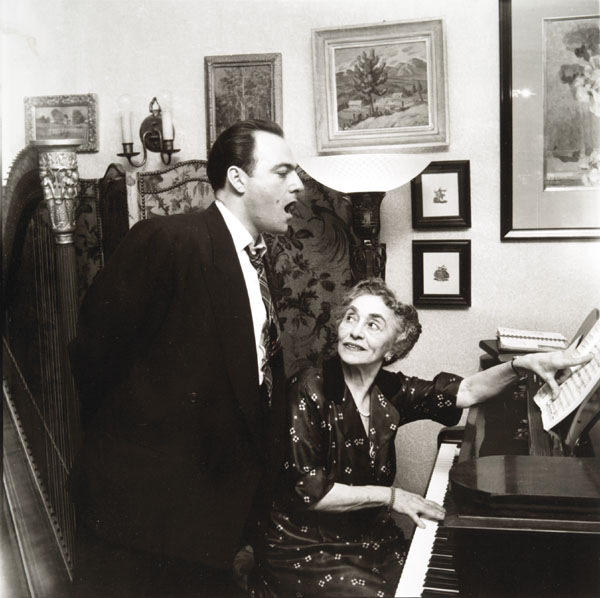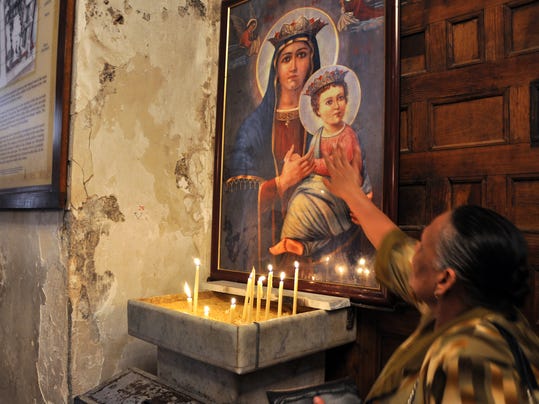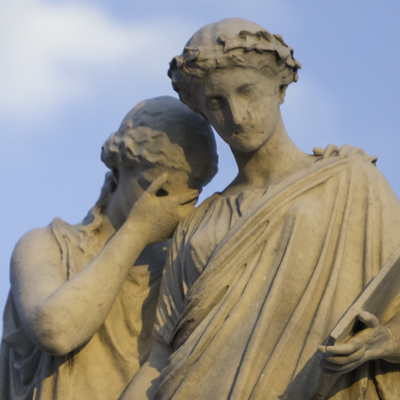
April, 2013
IN RECENT decades the milestones passed by Egypt's ancient but long-dwindling Jewish community have mostly been sad ones. Before the overthrow of King Farouk in 1952 Egypt's Jews numbered nearly 100,000. An eclectic mix of Mizrahis or Eastern Jews, Sephardim from around the Mediterranean and Ashkenazi immigrants from Europe, they included an Arabic-speaking working class indistinguishable from other Egyptians as well as a polyglot upper crust of bankers, industrialists, entertainers, parliamentarians and cabinet ministers.
Xenophobic nationalism exacerbated by the birth of Israel in 1948, and the subsequent wars in 1956 and 1967, prompted an inexorable exodus. By the 1970s every Jewish school, hospital and club had closed. Egypt's few remaining synagogues, under heavy police protection, struggled to achieve a weekly minyan, the quota of ten male worshippers required for a communal service. Vandals and squatters invaded Jewish cemeteries. The rich Jewish contribution to Egyptian life was all but forgotten.
In recent years things had improved a bit for those Jews, numbering well below 100 and most of them elderly women, who remained. This was despite the coming to power of the Muslim Brotherhood, a group whose rhetoric has often veered into anti-Semitic diatribes. Among educated Egyptians there has been a revival of interest in the country's 20th-century past, or perhaps more accurately, of nostalgia for what is now seen as a more genteel, cosmopolitan age. Unthinkable to generations of Egyptians weaned on imagery of Israelis and Jews in general as villains, Cairo cinemas last month drew full houses with the screening of a documentary called "The Jews of Egypt", featuring interviews with elderly exiles pining for their lost homeland.
The brightened picture is also the result of efforts by the community itself, and particularly of two consecutive, energetic heads of its Cairo branch, Esther Weinstein and her daughter Carmen. As owners of a modest print shop and stationers in central Cairo, the Weinsteins never expected to play leadership roles. But few others were willing to publicly acknowledge their Jewish faith when the presidency of the Cairo community fell vacant in 1994. The Weinsteins proved determined both to defend Jewish interests, and also to declare their Egyptian patriotism.
Largely due to their efforts, four of Cairo's synagogues have been restored in recent years, and its largest and oldest Jewish cemetery walled and planted with greenery. To preserve Egypt's Jewish patrimony, the Weinsteins mounted a spirited campaign to stop the export of Jewish artifacts or manuscripts. Esther Weinstein died in 2004, and Carmen on April 13th, at the age of 82. The new head of the Cairo community, Magda Haroun, a 61-year-old lawyer, inherits a much-diminished flock.
http://www.economist.com/blogs/pomegranate/2013/04/egypts-jews
Between June and November 1948, bombs set off in the Jewish Quarter of Cairo killed more than 70 Jews and wounded nearly 200.2 In 1956, the Egyptian government used the Sinai Campaign as a pretext for expelling almost 25,000 Egyptian Jews and confiscating their property. Approximately 1,000 more Jews were sent to prisons and detention camps. On November 23, 1956, a proclamation signed by the Minister of Religious Affairs, and read aloud in mosques throughout Egypt, declared that "all Jews are Zionists and enemies of the state," and promised that they would be soon expelled. Thousands of Jews were ordered to leave the country. They were allowed to take only one suitcase and a small sum of cash, and forced to sign declarations "donating" their property to the Egyptian government. Foreign observers reported that members of Jewish families were taken hostage, apparently to insure that those forced to leave did not speak out against the Egyptian government.3
When war broke out in 1967, Jewish homes and property were confiscated. Egypt's attitude toward Jews at that time was reflected in its treatment of former Nazis. Hundreds were allowed to take up residence in Egypt and given positions in the government. The head of the Gestapo in occupied Poland, Leopold Gleim (who had been sentenced to death in absentia), controlled the Egyptian secret police.
In 1979, the Egyptian Jewish community became the first in the Arab world to establish official contact with Israel. Israel now has an embassy in Cairo and a consulate general in Alexandria. At present, the few remaining Jews are free to practice Judaism without any restrictions or harassment. Shaar Hashamayim is the only functioning synagogue in Cairo. Of the many synagogues in Alexandria only the Eliahu Hanabi is open for worship.4
Anti-Semitism in the Egyptian press is found primarily, but not exclusively, in the nonofficial press of the opposition parties. The Government has condemned anti-Semitism and advised journalists and cartoonists to avoid anti-Semitism. There have been no anti-Semitic incidents in recent years directed at the tiny Jewish community.5
In September 2000 construction began on a highway-bridge through the ancient Basatin Jewish cemetery in Cairo. Cooperation and funding were provided by the Egyptian Ministry of Housing and an American ultra-Orthodox Jewish Athra Kadisha group. The plans will not harm any tombs and it will honor Jewish law concerning cemeteries.
Anti-Semitism is rampant in the government-controlled press, and increased in late 2000 and 2001 following the outbreak of violence in Israel and the territories. In April 2001, columnist Ahmed Ragheb lamented Hitler's failure to finish the job of annihilating the Jews. In May 2001, an article in Al-Akhbar attacked Europeans and Americans for believing in the false Holocaust.6 On March 18, 2004, 'Bad al-Ahab 'Adams, deputy director of Al Jumhuriya, accused the Jews of the terrorist attack in Madrid on March 11 as well as of the September 11, 2001 attacks.7
A positive development was the announcement that a Cairo synagogue built in 1934, which had been closed because so few Jews remain in Egypt, would be reopened in July 2005. The head of Cairo's Jewish community, Carmen Weinstein, and Israel's ambassador to Egypt, Shalom Cohen, arranged to reopen the synagogue, which the Israeli Embassy will help to maintain.8
On October 30, 2007, the Sha'ar Hashamayim synagogue in Cairo was rededicated by the city's small Jewish community. Many guests from Egypt and around the world attended the event which celebrated the synagogue's 100-year anniversary and the completion of recent renovations that occurred with assistance from the Egyptian government.9
In March 2013, Egyptian security agencies banned an Egyptian film about the Arab nation's once-thriving Jewish community, called "The Jews of Egypt," just a day before it was due to open in cinemas. Producer Haytham el-Khamissy said no reason had been given for the ban, which recalls the worst excesses of the famously censorial regime of former dictator Hosni Mubarak. The film is based on testimony from researchers, political figures and exiled Egyptian Jews, and presents a harmonious vision of early 20th century multicultural Egypt and asks "how did the Jews of Egypt turn in the eyes of Egyptians from partners in the same country to enemies?"10
1 David Singer, Ed. American Jewish Year Book 2001. NY: American Jewish Committee, 2001;
Aharon Mor & Orly Rahimiyan, "The Jewish Exodus from Arab Lands," Jerusalem Center for Public Opinion, (September 11, 2012).
2Howard Sachar, A History of Israel, (NY: Alfred A. Knopf, 1979), p. 401.
3 AP, (November 26, 1956); New York World Telegram, (November 29, 1956).
4Jewish Communities of the World.
5U.S. Department of State, 2000 Annual Report on International Religious Freedom, Released by the Bureau for Democracy, Human Rights, and Labor Washington, DC, (September 5, 2000).
6 U.S. Department of State, 2001 Annual Report on International Religious Freedom, Released by the Bureau for Democracy, Human Rights, and Labor Washington, DC, (October 26, 2001).
7U.S. Department of State, 2004 Report on Global Anti-Semitism, Released by the Bureau for Democracy, Human Rights, and Labor Washington, DC, January 5, 2005).
8 Jewish Telegraphic Agency, (July 13, 2005).
9 "Dateline - Cairo," The Jerusalem Report (November 26, 2007), p.40.
10 Ben Child, "Egypt Bans Film About Jewish Community," The Guardian, (March 13, 2013).
http://www.jewishvirtuallibrary.org/jsource/anti-semitism/egjews.html













